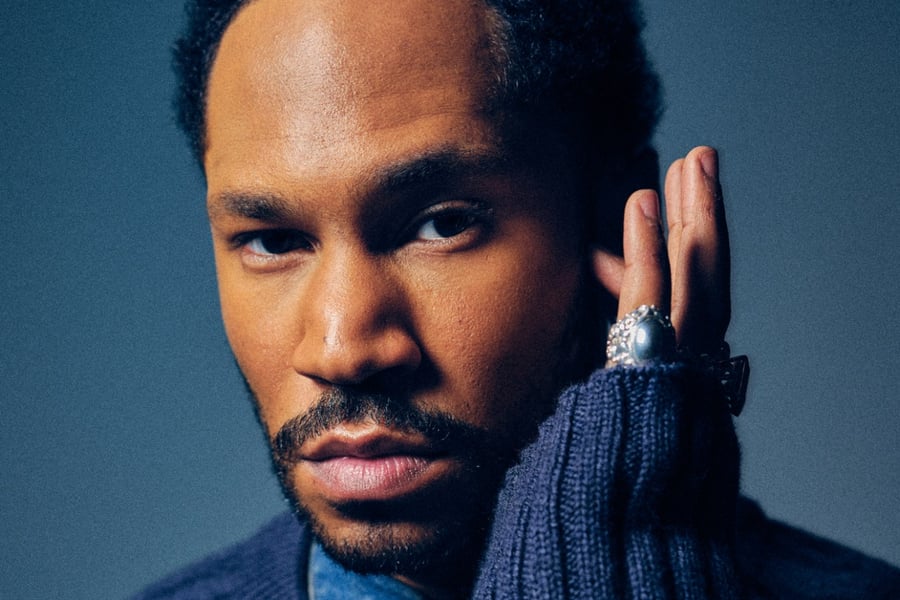The average high temperature in Quebec City in March is 33 degrees Fahrenheit, with a low of around 18. That’s apparently of no consequence to the locals, who have chosen the month for an outdoor music festival appropriately dubbed Igloofest. The annual event, billed as “the coldest music festival in the world,” is an opportunity for Québécois music lovers to flex their winter gear, with revelers in full-body ski suits, snow goggles, and what appears to be the most advanced outdoor apparel on the market.
Kaytranada, this year’s headliner, arrives backstage around 8 p.m. wearing black Celine sweatpants and Balenciaga wraparound sunglasses. He’s flanked on either side by his mom and sister, as well as a bevy of crew members trailing as he heads toward the main stage for his set. While he’s well-known as a maestro of dance floors across the world, he tells me later on that he’s only recently started working regularly with CDJs, a standard tool used by live DJs to play digital music in their sets. “I just got tired of carrying my laptop around,” he says. “I wanted to look more like a DJ.”
Onstage, you’d never guess he had any doubts about his position as a selector. Somewhere between a traditional DJ set and a live performance, his set at Igloofest races through his catalog as both a producer and solo artist, all to a raucous response from the crowd, which explodes in cheers at every beat drop. Despite the high-profile occasion, Kaytranada — one of Canada’s most famous musicians not named Celine, Abel, or Aubrey — is as laid-back as ever. He moves with a sense of familiarity, the local legend showing love to the folks who got him here. “This is the most Canadian thing,” he says backstage. “Like, to see all this snow, and people also just not giving a fuck.”
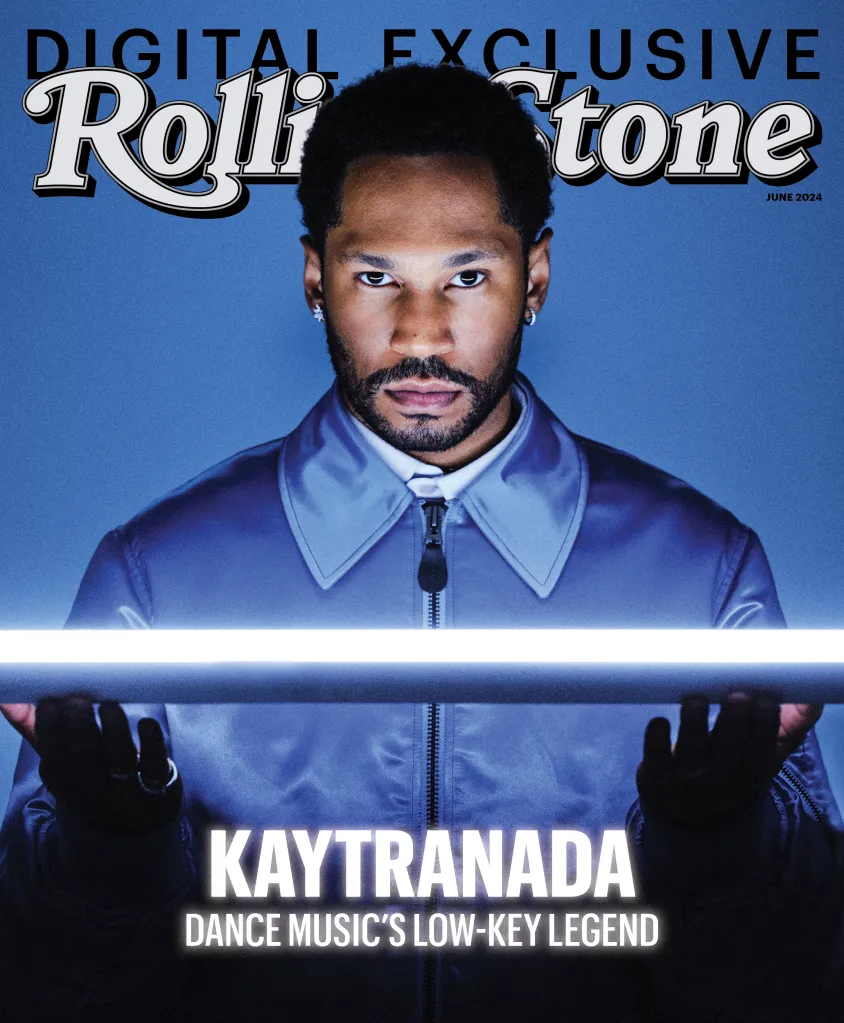
JACKET BY MARTINE ROSE. SHIRT BY LOEWE. RINGS AND RIGHT EAR EARRING BY BERNARD JAMES
After celebratory drinks backstage with the other Igloofest performers — DJs Sango and Kitty Ca$h, as well as Kay’s younger brother, who raps under the name Lou Phelps — Kaytranada tells me how, lately, he’s found himself balancing a range of expectations, all while trying to make music that still feels true to him. He says that his third full-length album, Timeless, due out June 7, takes its inspiration from Eighties New Wave, a decidedly left-field turn for a musician known for forward-thinking club bangers.
He says he decided to delete his Twitter, now known as X, because the comments from fans telling him who to collaborate with next, while well-meaning, became frustrating. “People are like ‘Oh, my gosh, you need to work with this artist. Is Beyoncé on your album? Is Tyler on your album?’ ” he says, now in his dressing room, clutching a glass of wine close to 1 a.m. “It’s like people are trying to choose for me what my album should sound like, and that would drive me crazy.”
Still, you can’t blame people for asking. Over the course of his career, Kaytranada has enlivened the rap and R&B atmosphere with pointed reminders of the fact that music is supposed to make you dance. He arrived in the 2010s like a missing link between Black music’s past and present, capable of fostering a seamless blend between a new generation of artists and the traditions that came before. Kaytranada’s stuttering, near-syncopated drum rhythms take their inspiration from the Haitian dance genre compas, while infusing the sound with traditional hip-hop and R&B rhythms.
After a string of popular remixes and SoundCloud edits, his 2016 debut, 99.9%, established him as an auteur-level producer, not unlike Madlib and J Dilla, who Kay tells me were his inspirations growing up. Released as a one-off on the indie powerhouse XL, the album introduced Kaytranada’s sound — replete with two-step rhythms and swinging, undulating drums — to the masses. The single “You’re the One,” featuring the Internet’s Syd, remains a classic: a hit so textured and innovative that it feels like it will never age. Kay’s debut album also set off a spree of more mainstream collaborations and, ultimately, a major-label deal at RCA.
Love Music?
Get your daily dose of everything happening in Australian/New Zealand music and globally.
With the Grammy-winning Bubba, released three years later, Kaytranada’s brand of dance-infused R&B took off. The album represented a shift in collaborations for the producer, who up to that point was content sending beats to artists and working with whatever they sent back. This time, Kaytranada took over the driver’s seat, working in-studio with left-of-center pop voices like Charlotte Day Wilson, Tinashe, and Kali Uchis. When it comes to collaborators, it’s never about picking the biggest name, but simply finding an artist whose sound meshes with Kay’s creations. Even so, he says, taking control hasn’t always felt natural.
“I think I’m kind of shy,” he tells me. “I always used to be very shy in the studio and sometimes let the artists just do their thing because I didn’t want to correct them or anything. It took me a while to understand, OK, I got to be the one that says ‘Do it like this.’ I don’t have a leader mentality. I’m learning to do that now.”
Bubba would go on to earn Kay the award for Best Dance/Electronic Album at the 2021 Grammys, an accolade that apparently flipped a switch for the musician, who shortly after made the decision to relocate to Los Angeles. “Montreal is not a celebrity town, but I get a celebrity treatment,” he says. “It doesn’t make me feel like myself.” He contrasts this with L.A., where “I could be in a room and there’ll be six other celebrities. That makes me more comfortable, like all eyes are not on me.”
KAYTRANADA GREW UP in Saint-Hubert, just outside of Montreal. A middle child in the family, he showed musical talent early on. After he graduated high school, he was invited to join an electronic collective called Artbeat Montreal, where his brother remembers him winning “a beat competition, like a cypher for beats.” Soon after, he’d make a name for himself playing shows around his hometown alongside his brother. They started out as a classic rapper-producer duo and went by the name the Celestics, a play on their last name, Celestin. (Kaytranada’s first name is Louis, but he goes by his middle name, Kevin; his brother, Louis-Philippe, goes by Lou.)
It didn’t take long for Kay’s beats to be recognized as coming from somewhere out of this planet. Even among the EDM-centric pop production of the 2010s, something about his sound stood apart. There was a more energetic swing, a syncopation rooted in history, an irresistible danceability. Before long, he was the main event, playing local clubs and parties around Canada.
Kaytranada’s parents, who had emigrated from Port-au-Prince, Haiti, when he was a toddler, shared a musical sensibility. His mother sang in a choir, and his father was an avid musician and audiophile. Kay says his dad had a big sound system in their house growing up, complete with a record player and DJ mixer. He’d hear tunes from legends like Bob Marley, Michael Jackson, and Lionel Richie alongside the traditional Haitian music his father grew up with. Kay’s two older sisters were another important influence. “My big sisters were always playing music around, and that’s how I really fell in love with hip-hop,” he says. “They had the keys to all the good music. I was exposed to a lot of great hip-hop music from the ’97-’98 era.”
I always used to be very shy in the studio. It took me a while to understand, OK, I got to be the one that says ‘Do it like this.’ I’m learning to do that now.
As he started to experiment with the nascent digital-production tools that emerged in the early 2000s, Kaytranada got much of his inspiration from J Dilla, whose intricately chopped samples might be his clearest point of comparison. “I really studied Dilla,” he says. “Instead of studying for school, I studied his music — him and Madlib were producers where I was just trying to understand how they would chop a sample. Dilla would do those micro-chops that don’t make any sense, but sound like a big beautiful collage. I got so inspired by that. I had a phase where I was just remaking his beats when I was, like, 15, remaking Donuts.”
Kaytranada started making music with his younger brother around the same time. “We had the microphone that came with a PC, and an audio recorder that could record 30 seconds of voice,” he says. “We would play an instrumental from a 50 Cent website, and just rap over it and make full songs. I always wanted that for us, to have a career as a Gang Starr type of thing. The producer and the MC.”
The pair released their debut project as the Celestics, titled Massively Massive, in 2011. But it soon became clear that Kaytranada’s production was taking off on a different level. “I think we went separate ways because I got too successful with the electronic things I was doing, and that was not easy for both of us,” he says. “People were bringing up ‘Kaytranada and his brother.’ My brother really didn’t like that. I didn’t really appreciate it either. I just wanted us to be called a duo.”
Looking back, Kay adds, his brother “was the leader of things. He was calling the shots. And for me to become the person that everybody’s looking at, it was not that easy.” Eventually they came to the decision to split up the group. Kay would still produce for his brother, but the dream of a Gang Starr-like duo would have to wait. While Kay’s career was taking off, the tension lingered in the background until around 2020, when both came to a better understanding of what had happened.
“Honestly, it was kind of like a dagger to the heart,” his brother Lou tells me later. “Me being young, I was like ‘Why aren’t you bringing me?’ And he was like, ‘Man, I got to do my own thing. You got to blow up by yourself too.’ ”
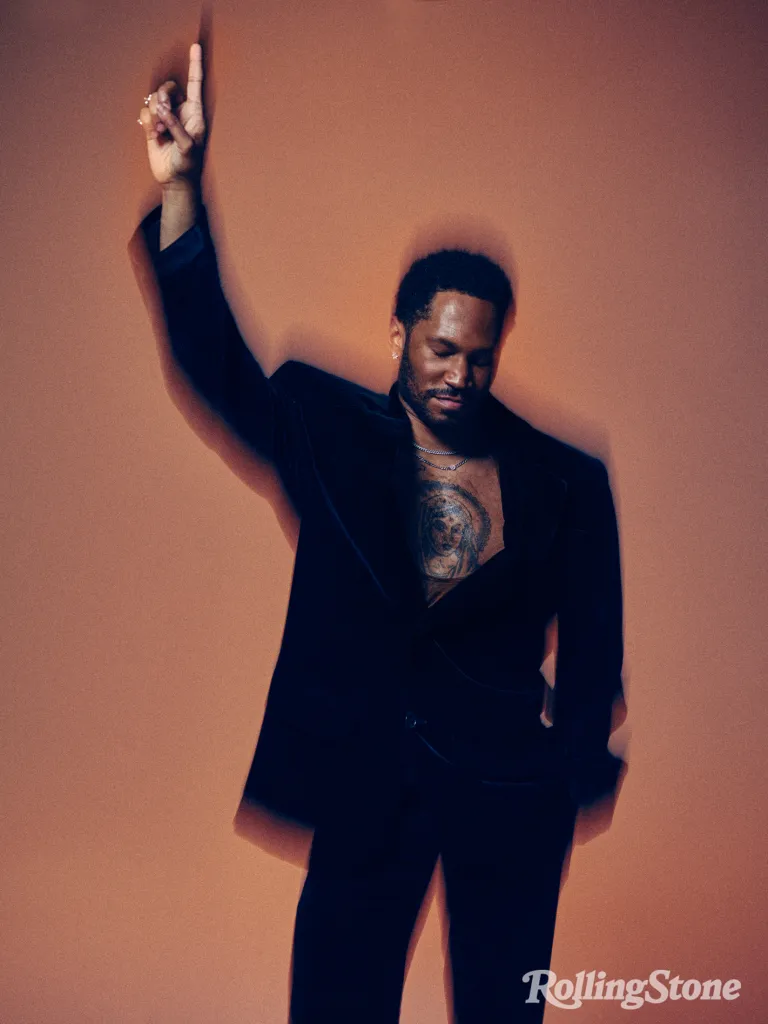
OUTFIT BY SAINT LAURENT
THE NIGHT BEFORE IGLOOFEST, I join Kaytranada and the rest of the festival lineup at Elena, an Italian restaurant in Montreal’s Saint-Henri neighborhood, for a pre-show link-up. Sango, who notably collaborated with Frank Ocean on a set of remixes in 2019, is scheduled to play a show later that night in the city. Kitty Ca$h, a Brooklyn-based producer and DJ, also has a show this evening, setting the stage for a busy night out.
At dinner, over cacio e pepe and Caesar salad, Kay and his brother have an undeniable familial chemistry, and it’s easy to pick up on Kay’s sense that Lou was the leader. Where Kaytranada is shy and reserved, his brother — who looks just like him — is jovial and outgoing. Outside the restaurant, as we sort out which cars everyone is traveling in, a fan comes up to Lou to shake his hand and offer his appreciation for his music. In another life, the tables might have been turned, and Kaytranada would’ve been the one behind the scenes.
“In my heart, I always wanted to be the producer, but the Kaytranada thing just … I wouldn’t say got out of control,” he says. “More like, ‘Oh, that really works. Continue with that.’ ”
Now, we got Lil Nas X and rappers from the LGBT community just coming out. R&B artists, too. It’s more acceptable and more welcome.
In 2016, Kaytranada came out of the closet, giving an in-depth interview to The Fader ahead of the release of his debut. “I still don’t think many people know that I’m gay. Even with that story,” he jokingly tells me. “Freddie Gibbs was one of the first artists that was like ‘I’m proud of you, man, keep doing your thing.’ I thought that was crazy. That gave me hope.”
He says that while he knows hip-hop at large still has issues with homophobia, a lot has changed in the years since he first came out. “Now, we got Lil Nas X and rappers from the LGBT community just coming out. R&B artists, too,” he says. “It’s more acceptable and more welcome. I heard Snoop and Dr. Dre were performing at Pride in L.A. That’s crazy.”
After dinner, we head to Sango’s show at a club called Newspeak. The venue is on the top floor of an industrial-style building, and by the time we arrive, Sango is already busy rearranging bodies on the dance floor with an eclectic mix of amapiano, R&B, and house that make his friendship with Kaytranada seem instinctive. Sango finds connections that only seem to make sense on a dance floor. At one point in the night, Justin Timberlake’s hit “Rock Your Body” booms through the speakers before somehow blending perfectly into an Afrobeats track.
After the show ends on the earlier side, around 11, we head to the apartment of one of Kay’s friends, a local club owner and promoter, to hang out before Kitty Ca$h’s set later in the night. In the car on the way, Kay and Lou sit in the back seat riffing about hip-hop. At one point the subject of Kanye West comes up, and both Kay and Lou agree that he remains one of the most influential musicians of all time and that his most recent antics are a disappointing continuation of traits he’s shown throughout his career.
Later on, at the apartment, the conversation turns to 4Batz, the fast-rising R&B crooner who got a cosign from Drake, as well as lots of industry-plant accusations. My skepticism about his music is quickly shot down by the party’s guests, though I’m pretty sure I get a tacit nod of agreement from Kay, who later tells me that he wonders where he fits in today’s landscape. “I’m not in the standards of pop music. So that would mess with my head a lot,” he says. “In my less-confident days, I’d be like, damn, it’s kind of hard to just be yourself in this game because you want to bring something new.”
He plays me an unreleased track he made with the rapper Mach-Hommy, rumors of which have floated around the rap internet for some time now. (A few weeks later, it will pop up as the first single and title track from Mach’s new album, #RICHAXXHAITIAN.) It slaps. Mach, known for his gritty raps and his anti-fame attitude, is both an unlikely and obvious collaborator for Kaytranada. Each musician is rooted in a DIY ethos, and both infuse their music with their shared Haitian heritage. “A lot of people don’t know the shit that he did on the house-music shit,” Kay says. “He raps on a lot of house joints, and it sounds so effortless and nice. He was showing me the house joints, and I was in shock, like, ‘What the fuck?’ ”
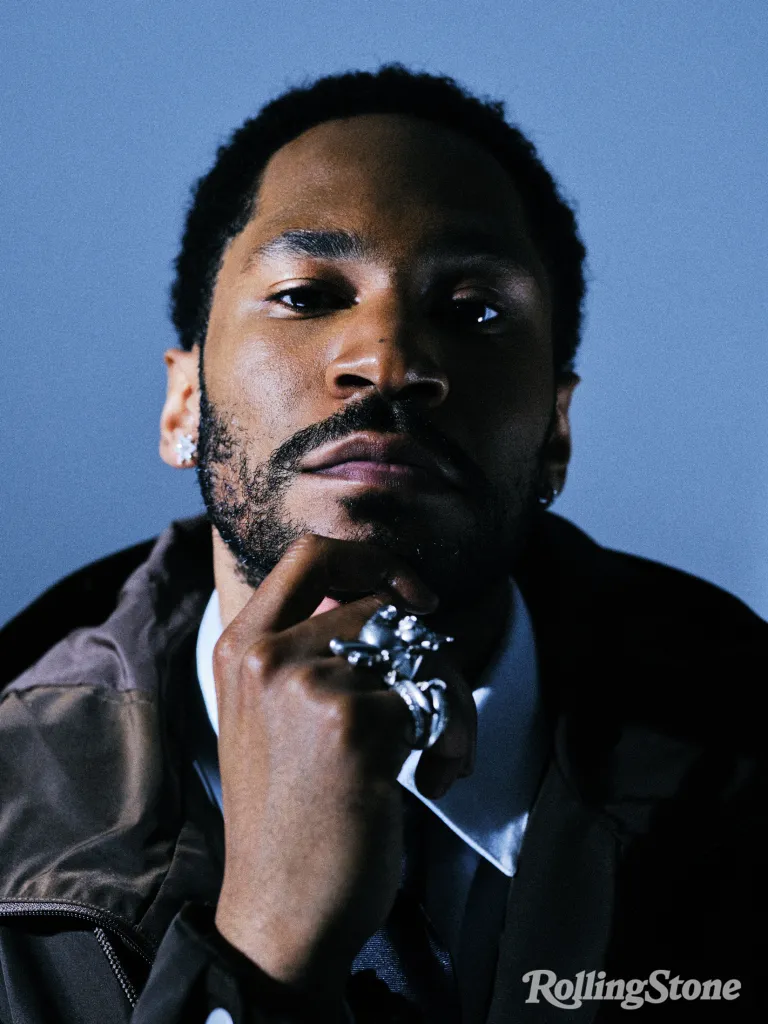
JACKET BY SANDRO. TIE AND SHIRT BY GUCCI
Kay got inspired to explore a new sound of his own in 2022, while he was on tour with the Weeknd. “I don’t know what got into me, but I ended up doing six demos with my own vocals, me singing,” he says. One of those demos, called “Stepped On,” made his new album. “I was really writing this song for the Weeknd, technically,” he adds. “But then it sounded nice to hear me singing on the song.”
He says he’s thinking about doing a full project as a vocalist next. “It’s probably going to be a different moniker, but it’s going to be Kaytranada production on my own vocals,” he says. What appeals to him about this direction is the sense of artistic freedom it offers. “The New Wave and the grunge era, people did not have the best voices, but they made amazing music,” he says. “This is just simply art, and it’s how I feel.”
Timeless has been years in the making. Kay tells me he recorded most of the songs around the time he received the Grammy in 2021. He’s got a song with Childish Gambino that he recorded in this same period, as well as features from Anderson .Paak, SiR, and Channel Tres. “It’s not big, big names,” he says, “but it’s definitely artists that I love to work with.”
Kay tells me that there are “so many things that changed since the last album,” most notably the technology he’s been able to use. He briefly geeks out over new sampling techniques made possible by AI. “There’s this song called ‘Seemingly’ where I sampled this Don Blackman record, and I’m just playing around the keys,” he says. “Now that I have the AI stems of it, I’m just breaking down the bass, and the keys, and the vocals to it. And the drums are crazy. If the AI couldn’t exist, I would not even think about sampling this record. [But] now I can mute the drums, and I can have space to add my own drums and make my own beat with that.”
He says he’s still inspired by the sounds he grew up hearing as a kid, the so-called shiny-suit era of hip-hop. “A lot of hip-hop heads are discrediting it, but for me, it’s still an era where they would sample a lot of Studio 54-type disco songs, and then slow them down, and then just freak them a little bit,” he says. “I have this song with my brother where it’s this disco sample. It reminds me of that era, like the ‘Mo Money Mo Problems’ music video, it kind of gives that vibe.”
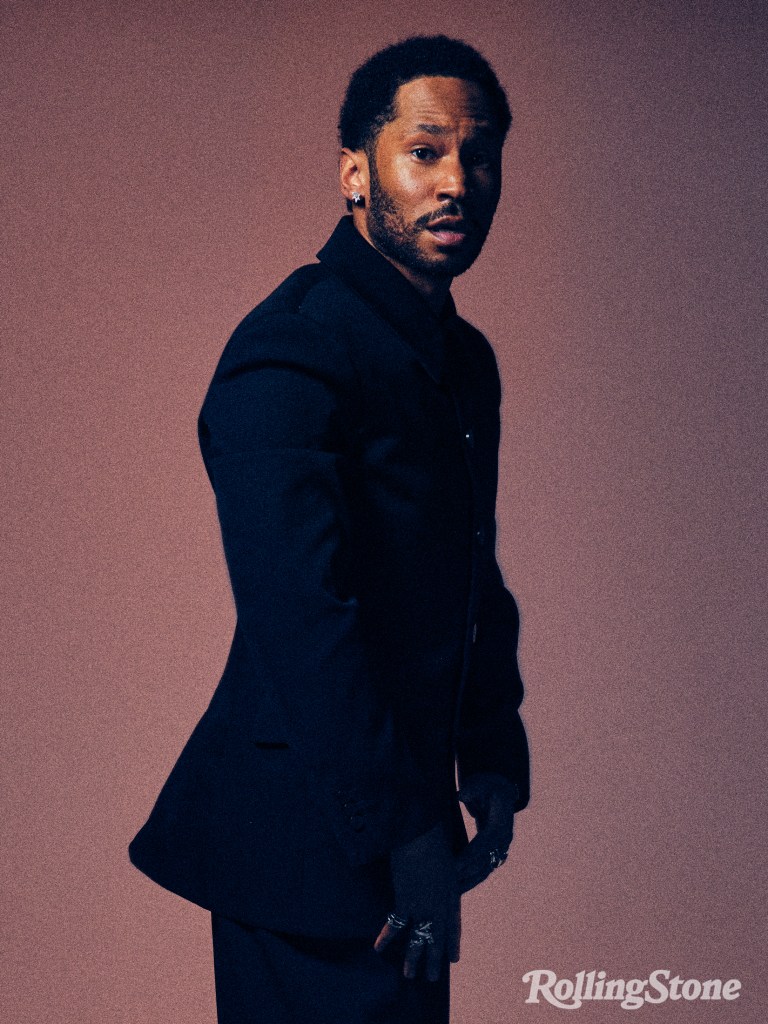
OUTFIT BY VERSACE.
The collaboration with his brother will mark the first time they’ve worked together on one of Kaytranada’s solo albums. “It’s been a long time waiting,” Kay says. “My mom’s been mad for a while.”
Lou says he’s thrilled the collab is finally happening, but more importantly, that his brother is entering this new phase in his life and career. “I can’t say he wasn’t confident, but he was so shy and so reserved that he would never allow himself to make decisions,” Lou says. “He would always consider other people in his decisions. But now he’s just a boss. You can tell he knows who he is. He knows his power. He knows the importance that he has on the community, and on the people around him.”
After Igloofest, it is somehow snowing even more. The streets are caked in powder as we head to the afterparty in a cab. Anywhere else, I’m sure this amount of snow would make for a slow night at a club, but not in Quebec. At the packed-out venue, Kay and his brother jump on the decks, teaming up like when they were kids. This, too, feels natural. “We both got into our passions at the same time,” Kay says. “So us DJ’ing together is … I don’t know how to explain. It’s just easy.”
Production Credits
Photography Direction by EMMA REEVES. Styling by VON FORD at THE WALL GROUP. Grooming by ALEXA HERNANDEZ at THE WALL GROUP using TOM FORD BEAUTY. Set Design by ANNIKA FISCHER. Production Manager: MIABELLA CHAVEZ. Lighting Technician: DOMINIQUE ELLIS. Digital Technician: RAMON FELIX. Photography assistance: ANGEL CASTRO. Styling Assistance: BRANDON YAMADA. Photographed at DUST STUDIOS.
From Rolling Stone US

































